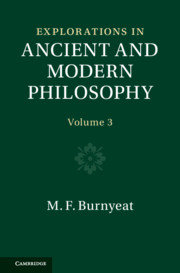Book contents
- Explorations in Ancient and Modern Philosophy
- Explorations in Ancient and Modern Philosophy
- Copyright page
- Contents
- Illustrations
- Preface
- Acknowledgements
- Abbreviations
- Introduction
- Part I The Republic
- Chapter 1 Plato on why mathematics is good for the soul
- Chapter 2 Long walk to wisdom
- Chapter 3 The truth of tripartition
- Chapter 4 Plato and the dairy-maids: the distribution of happiness inside and outside the ideal city of the Republic
- Chapter 5 Justice writ large and small in Republic IV
- Chapter 6 Fathers and sons in Plato’s Republic and Philebus
- Chapter 7 By the Dog
- Chapter 8 Culture and Society in Plato’s Republic
- Part II The past in the present
- Appendix: The archaeology of feeling
- Bibliography
- Index locorum
Chapter 3 - The truth of tripartition
from Part I - The Republic
Published online by Cambridge University Press: 24 March 2022
- Explorations in Ancient and Modern Philosophy
- Explorations in Ancient and Modern Philosophy
- Copyright page
- Contents
- Illustrations
- Preface
- Acknowledgements
- Abbreviations
- Introduction
- Part I The Republic
- Chapter 1 Plato on why mathematics is good for the soul
- Chapter 2 Long walk to wisdom
- Chapter 3 The truth of tripartition
- Chapter 4 Plato and the dairy-maids: the distribution of happiness inside and outside the ideal city of the Republic
- Chapter 5 Justice writ large and small in Republic IV
- Chapter 6 Fathers and sons in Plato’s Republic and Philebus
- Chapter 7 By the Dog
- Chapter 8 Culture and Society in Plato’s Republic
- Part II The past in the present
- Appendix: The archaeology of feeling
- Bibliography
- Index locorum
Summary
Since the arguments that Plato provides in the Republic for the thesis that the human soul consists of three parts (reason, spirit, appetite) are notoriously problematic, I propose other reasons for accepting tripartition: reasons that we too could endorse, or at least entertain with some sympathy. To wit, (a) the appetitive part of Plato’s divided soul houses desires and tendencies we have because we are animal bodies programmed to survive (as individuals and as a species) in disequilibrium with a variegated, often varying environment, (b) the spirited middle part houses status concerns that belong to us as social animals, while (c) what makes us rational animals is a faculty of reason, conceived in strikingly non-Humean terms, which determines what is best all things considered. Other psychic tendencies may then be explained in terms of the education and mutual interaction of the three parts we are ‘programmed’ for from birth.
- Type
- Chapter
- Information
- Explorations in Ancient and Modern Philosophy , pp. 78 - 95Publisher: Cambridge University PressPrint publication year: 2022

